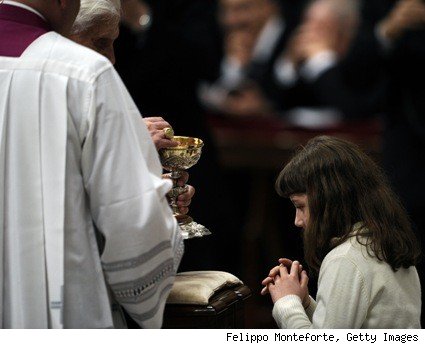By Delia Lloyd
Politics Daily
April 8, 2010
http://www.politicsdaily.com/2010/04/08/why-i-could-no-longer-be-a-catholic/
An old friend of mine recently posted the following sentence on his Facebook page: "I know this is totally not a PC thing to say, but can someone please explain to me why
anyone is still Catholic?"
It's a fair question. And my Politics Daily colleague, Melinda Henneberger, has one answer. In an honest and moving piece she wrote a few days back, Melinda tells us that she's as put off as the next person by the current sex abuse scandal roiling the Catholic Church, as well as by the Vatican's latest attempts to play the victim and point fingers. At the end of the day, though, Melinda is going to hang in there with this church, because being Catholic is integral to who she is. "In the end," she writes,"it is not about them."
 |
Melinda's argument is a variant on one that many of my pro-choice Catholic friends use when defending their choice to remain in a church even when its hierarchy (and -- it must be said -- most of its adherents) condemn a practice which my friends find perfectly legal and justifiable. They are somehow able to separate their personal beliefs on this issue from official church doctrine, and can carry on as practicing Catholics because they buy into other church teachings.
In both versions, these arguments imply that the messenger doesn't matter. If you yourself can find solace and meaning in embracing Catholicism at its "base," it doesn't really matter what the hierarchy says or does.
I respect the views of all concerned and I strongly believe that everyone has to find their own way toward religious practice. Lord knows I do. But personally, I'm not convinced by this idea that we're free to ignore the Pope. I'm currently contemplating becoming part of a faith -- Judaism -- which has its own issues. (Among others, it's not at all clear that they'd be willing to take me.) But even if I were contemplating re-entering Christianity, I doubt that I could stomach becoming a Catholic right now, despite being raised in an observant Catholic family. And while the sex abuse scandal wouldn't be the only factor, it would certainly weigh heavily in my thinking.
This point was driven home to me this past weekend, when an old friend from the States came to visit us at our home in London. She's a practicing Catholic who would very much like to raise her children in the Catholic Church. But she's increasingly troubled by the sex abuse scandal, and has refused to give the church any money since the scandal first broke in America back in 2002. Her husband, an attorney who was raised as a Baptist but -- other than the scandal -- is reasonably comfortable with Catholicism, wonders whether his wife would be willing to continue to be a member of any other institution where all of this was going on inside it.
He's got a point. You certainly wouldn't keep sending your kids to a school whose management tacitly condoned pedophilia or looked the other way. Nor would you work for a business that did so. I doubt anyone would even join a gym with this track record, no matter how much they liked the equipment and the staff.
Nor is it clear to me that it is just a management problem. As the writer and former Catholic priest James Carroll noted recently, the sex abuse scandal isn't just about the current Pope. It's about an institution that systematically undervalues women, champions obedience and authority over self-expression and democracy, and actively suppresses normal (by which I mean any) sexual impulses through its chastity vow.
My friend who just visited me is actively reconsidering whether she wants to remain in the Catholic Church. Apparently, many of her friends back home have been encouraging her for years to join the Episcopal Church, often described as "Catholicism without the Pope." While she was here in London, she attended an Easter service at a local Church of England parish and felt quite comfortable there. What's holding her back -- as I suspect holds many Catholics back right now -- is the cultural betrayal she feels for her Catholic grandparents who've passed away but instilled in her the service-oriented aspects of Catholicism that most resonated.
The American Episcopal Church has already fragmented over issues such as homosexuality and the ordination of women, and now seems headed for a definitive schism with the broader Anglican Communion. Maybe the Catholic Church will do the same. Or maybe change will come from within. That's certainly Carroll's view. He thinks that a revolution is already afoot at the base of the Catholic Church and that it's only a matter of time before the church hierarchy is forced to follow suit. Others are less sanguine.
Personally, I think the Catholic Church would have a lot of takers if it undertook true, bottom-up reform or developed a free-standing liberal wing.
And who knows? Even someone as conflicted as I am over religion might decide to show up
Any original material on these pages is copyright © BishopAccountability.org 2004. Reproduce freely with attribution.